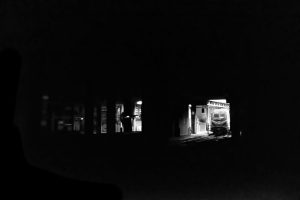I had hopes for New Orleans.
In my dreams, arriving mid-evening, I would drop my bag at a hotel, walk the crowds and press of people in the French Quarter alone. I would sit on a bench at Preservation Hall for a song or two, then listen for music escaping any open doorway and wander inside when I liked what I heard. I would linger on Bourbon Street, just because it’s Bourbon Street, then follow whatever path seemed alluring.
I would find street food, or I would find a prix fixe restaurant with tuxedoed staff. It didn’t matter; I would eat well. Shrimp Etouffee, perhaps. Maybe Filet Mignon Charlemond. Maybe a King Cake burger.
I would carry my camera with a wide-angle lens, looking for those moments when a crowd is revealing.
In the morning, I would go to Café Du Monde and order Beignets with chicory coffee because it’s a stereotype, a cliché, and because I did it once before on an early morning when there was fog on the river and I was barely nineteen years old. I have never forgotten that heavy quiet. Then I would find my way to the rail station, weary but happy, filled with real and imagined nostalgia, and begin a ride through the American south.
But, of course, that’s not the way it happened.
The train from Los Angeles arrived at 4:00 a.m. Outside the station, the sky was already growing light.
At the hotel, The New Orleans Courtyard Hotel, which used to be a famous jazz club—think Ellis and Wynton Marsalis, Lady BJ Crosby, James Booker, Alvin Baptiste—in a building called Dupaquier House on Rampart Street, I told the front desk clerk to wake me in an hour.
“You’re kidding,” he said.
“The next train leaves at 7:00 a.m.,” I said. “I have to be at the station at six.”
“Sorry,” he said.
I walked through an open courtyard, past a glass-smooth swimming pool, up stairs then into a hallway and my room. There were wooden floors and a gargantuan bed. I got undressed and set two alarms of my own.
No jazz. No crowds. No food. But I swear, falling asleep, I could hear the echo, or the promise, of it all.
I wanted New Orleans.
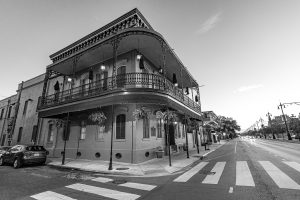
When my first alarm rang, I dozed and waited for the wake-up call from the front desk. It never came. After a few minutes, I got up. The shower had fire-hose pressure, which was nice, and soon I was at the desk again. Same clerk.
“Sorry,” he said once more.
So now I am standing in the middle of a trafficless street, taking pictures of the hotel and the tattoo shop next door, wondering if I’ll see the same Uber driver.
New Orleans may be loud at night, but it’s very quiet in the very early morning. The air is heavy. The river is only a few blocks away. It’s easy to imagine what I have not seen, but imagining only makes the missing more poignant.
Hello New Orleans. Good-bye.
~~~
At the nearly empty station, my notes tell me the murals were painted by Conrad Albrizio and depict the history of Louisiana. I stare at them, too tired to catch the narrative. The coffee in the sleeper car waiting room is terrible. I board the train as soon as the doors open.
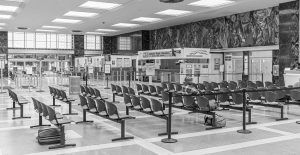
My compartment is different. The Empire Builder, the Coast Starlight, the Sunset Limited, each use a sleeper car called a Superliner. However, the Crescent, the Lakeshore Limited, any train coming in or out of New York, use a Viewliner. With two levels, the Superliner is too tall for the tunnels into Penn Station. The Viewliner is one level and has a toilet in the room.
I put my bag on a seat and it occurs to me that with some food and water, I could hide in a Viewliner room this whole trip, which does not strike me as a bad idea.

The mood has changed.
Paul and Edith are gone. Vergie is gone. Linda, Josh, Dan, Jimmy, and Adrian are all retracing their routes again, new faces and old stories.
Halfway through the circle of this trip, I’m not sure I want to start over.
And how do I make any sense about what I’m going to see? This is hurricane territory. Nearly every building damaged, repaired, remade, removed by Katrina, the hundreds of storms before that one, the very many after. This is creole country. This is blues and gospel and birth of rock ‘n roll country. This is slavery and Civil War and Civil Rights ground. This is Cherokee and Jim Crow land.
Everything I see today will wear beauty and horror on the same sleeve.
And I’ll only see it at speed.
I already know this train will pass within a few blocks of the Birmingham jail where Dr. Martin Luther King Jr. wrote this letter and I already know I won’t be able to see it.
I already know this train will pass through Charlottesville, Virginia. My parents once lived in Charlottesville, and then later in a town nearby called Free Union. Charlottesville has been in the news for terrible reasons.
I already know this train will pass through Greenville, South Carolina. My first job after graduate school was teaching at a college in Greenwood, South Carolina, fifty miles south down Highway 25. It was a good job in an often horrible place.
I have stories of the American south I’ve lived. And I have the stories of others in my soul. These are not snippets. But what I see will go by so fast.
With a small lurch, we are underway.
~~~
Quickly, the train crosses Lake Pontchartrain on the Norfolk Southern Lake Pontchartrain bridge. My notes tell me that at 5.8 miles this is the longest railroad bridge in the United States and the longest bridge over water in the world. It’s low, close to the water.
Ready, I think. Set.
There is just enough wind to make the surface of the lake glimmer and dance. A few clouds on the horizon, the morning is bright and beautiful.
I put my feet up on the opposite chair and rest the camera in my lap.
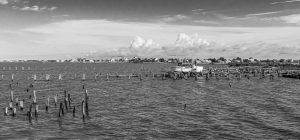
At breakfast, the serving staff welcomes me, energetic and happy. I am looking forward to what has become a familiar routine. The same conversation at every table, every time.
Who are you?
Where are you from?
Where are you going?
Why are you taking the train?
It’s a bit of genius, I think, to have community seating. Everyone is always optimistic. Everyone is in a permanent state of hello. Will you be my new friend?
I want to hear stories with an new accent, a new point of view.
This morning, however, I am too early. As usual, I am at the door when it opens. Throughout my breakfast, though, no one else enters the car.
So be it.
With fresh coffee, I settle in my room as the train moves through Slidell, Picayune, Hattiesburg.
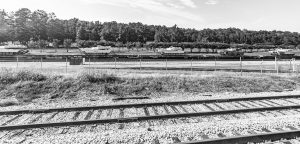
My notes tell me we are near underground salt domes where nuclear bombs were set off to test seismic detection. We pass the streets where the KKK killed Vernon Dahmer. I can’t see any of this. Yet, there is no way to ignore or forget.

We cut through the middle of small towns and then over bayous, into forests of pine trees, other trees covered in kudzu, tall trees very close to the tracks.
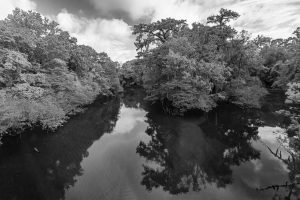
Watching tree branches rush by the window has its own kind of beauty, but it’s difficult to photograph. So much goes by the window! Too close. Too fast.
At speed, the landscape of the American south contradicts itself with every turn. Swamp becomes forest becomes hill becomes river becomes field becomes town becomes oppressive blanket of kudzu becomes poverty becomes grace.
Every time I want to take a picture, I fear I’m only getting a sliver. A filmmaker would do better.
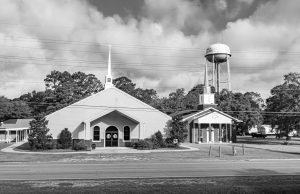
Then, somehow, I see them coming. Perhaps I’m sitting just right in my room, or perhaps the track is curving slightly, but I can see two kids, high-school age, watching the train approach. I see the boy start to wave. The girl does not. He encourages her and so hesitantly she raises her arm and begins to wave as well.
This sounds like it takes some time. In truth, we’re talking seconds.
I raise my camera in one hand, and with the other I wave back as hard as I can.
I hope they see me.
Everyone waves at a train. Someone should wave back.
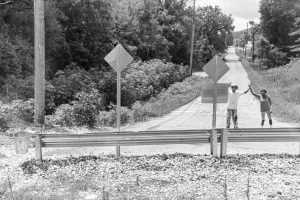
We pause at the Meridian, Mississippi, station, already behind schedule.
Meridian, my notes tell me, is the birthplace of Jimmie Rodgers, “The Singing Brakeman,” the “Father of Country Music,” the “Blue Yodeler.” Born in 1897, his first job was as a water boy on the railroad, where he also heard and learned to play music. He became a brakeman, a recording star, contracted tuberculosis, recorded with Louis Armstrong.
There should be a museum here, a festival, a celebration!
Meridian is where General Tecumseh Sherman demolished 112 miles of southern railroad.
There should be a lesson here, too.
I have no idea why we are stopped.
The P.A. system is silent.

I fear I’m being anti-social. There is too much to see out the window and I’ve not lingered in the dining car or the bar to meet new people. I am enjoying the alone-time. One of the deep truths of a sleeper compartment, especially one alone, is the way it can open space for introspection, a space for dealing with what a moving view of the landscape offers.
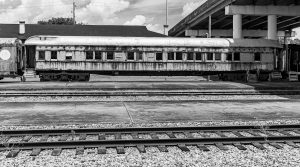
1:40 in the afternoon, still south of Tuscaloosa, the train comes to a stop. It does not appear to be a track signal or a warning light stop. I go exploring and find two conductors standing at an open door at the back of the train, in the baggage car. They are not searching the rails or the grounds nearby. They are only talking to each other. But the length of this stop and the open door makes me wonder if we’ve hit somebody.
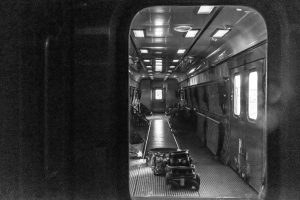
The conductors are too happy, I think, for a body on the tracks. They are laughing, passing time. My mind runs through the possibilities.
Someone has found The Russian.
The Littles are back.
There’s been an avalanche of kudzo and the tracks are impassable.
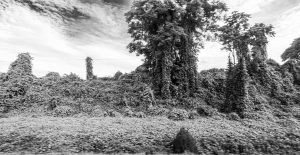
Then again, it could just as easily be true that we are only waiting for a freight train to pass us on the other rail and the conductors want fresh air.
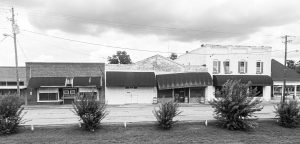
At 1:45 pm the other Amtrak Crescent, the one heading south, passes us. A few moment later, we begin rolling backwards. Ah, I think. This is why two conductors stand at an open, rearward facing door. We are rejoining the main line. The siding we are on is a dead-end.
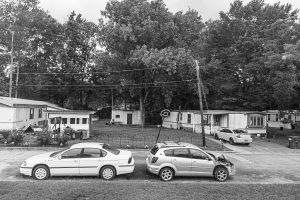
A father and three of the most horribly behaved children I’ve ever seen get on the train. Their sleeping compartments are near mine. They yell. They scream. They complain.
“I thought it would be bigger!”
“This is a room?”
“I hate this!”
The father tries consolation and accommodation. He’s reaching for peace instead of confrontation. The screaming gets worse.
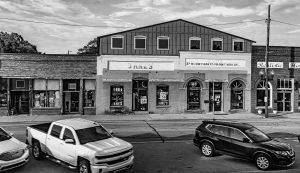
I shut my door and pull my curtains.

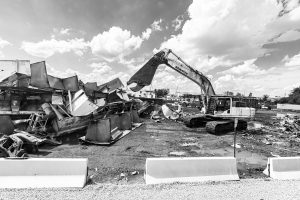
We roll through Tuscaloosa, Birmingham (I cannot see the jail), Anniston, Atlanta, Gainesville, Toccoa, and finally, after dinner in my room and some wine, to sleep.
~~~
Waking up in sleeper car on any railroad on the planet is a wonder. The room is familiar enough. But the color of light, the smell of air, the press of temperature has all changed from the night before. You are in the same place, your room, but your room has moved hundreds of miles away. The first glance outside the window, at a world rushing by, is magic.

There is the movement, the rocking of the car and bed, which is perhaps an echo of a rocking crib. And there is the sound, the distant engine, the rush-by of crossing bells, the wheel clack where rails are joined.
This morning, the Blue Ridge Mountains, the Appalachians, misty under an overcast sky, the early sun sometimes breaking through, are intensely pretty.
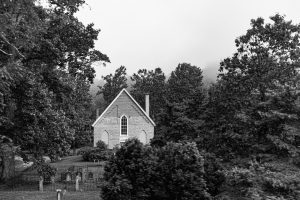
I prop myself up in bed and watch Danville go by. My notes tell me about another catastrophe. Somewhere along this line a train once left the tracks. The Southern Railway 1102, better known as the Fast Mail, had a reputation for never being late. On September 7, 1903, however, a thirty-three-year-old engineer named Joseph A. Broady, who went by “Steve,” was at the controls of a new engine and behind schedule. There were signs along the way to remind engineers to watch their speed. The path had tight turns and steep grades. Broady came down a hill too fast and could not make the turn before the 45-foot-high Stillhouse Trestle. The engine and every car left the tracks and dove into the ravine. Eleven men died, including Broady. Seven men and a case of canaries survived.
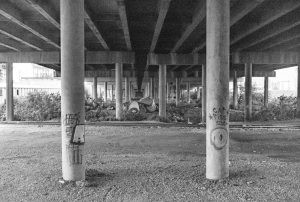
Railroad crashes make good songs, it seems. Vernon Dalhart’s 1924 rendition of “The Wreck of the Old 97” became the first country song to sell a million copies. Johnny Cash, Woody Guthrie, Pete Seeger, Hank Williams Jr., Roy Acuff, Boxcar Willie, John Mellencamp and others have taken it up.
I don’t see the trestle and I don’t know if the rail still runs that path. But I do see the hills. I know the urgency of wanting to make up time. I can imagine the sounds.

We arrive in Charlottesville before 8:00 a.m., nearly back on time.
Coming into town, the forest is often up close to the tracks and it’s difficult to see much, but when an opening arrives the Blue Ridge Mountains are beautiful. A stunning valley goes by when I am without my camera. Kudzu covers trees and telephone poles recede into the distance.
I know this town. The drive from town out Barracks Road, turn right at Free Union Road, turn right again at Maupin Brother’s store was the route to a family farm. But we’ve been gone more than twenty years. It’s been a long time and lot has happened. I look hard. From the train I cannot see a single familiar road.
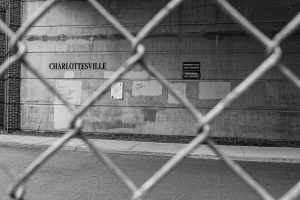
Underway again. On the way to New York this train will pass Manassas, where 24,000 civil war soldiers died simply to control a railway junction.
In Alexandria, the train will exchange diesel for electric engines. Every mile will become more urban.
Leaving the South, I have a thought which does not bring me peace or joy. Everywhere else, every view out the window, every human story I know or have been told, rises from the landscape. On this route, though, the stories have been imposed.
In the D.C. metro station, a lot of people get on, a lot of people get off. This is daily commuter-ville now. A lady in a big floppy hat and an Oregon sweatshirt wrestles her luggage off the train with help, lights a cigarette and then loudly, demandingly, calls for a Red Cap. She tells me that tomorrow she is going back to Montana via Chicago.
“Please no,” I think.
The dad with the horrible kids gets off as the train is inspected by a drug sniffing dog.
“Please,” I whisper. “Just please.”

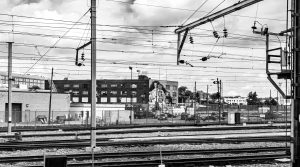
We leave Washington D.C. much sooner than I expect. The view is only sad. Concrete. Steel. Hard. Philadelphia, Trenton, come and go.

As we pull into the western side of New York City, it begins to rain.

